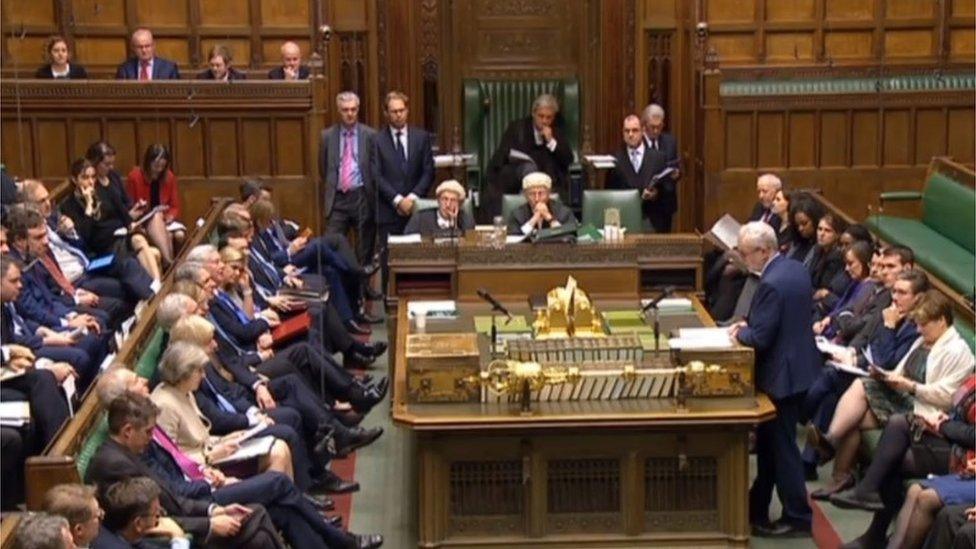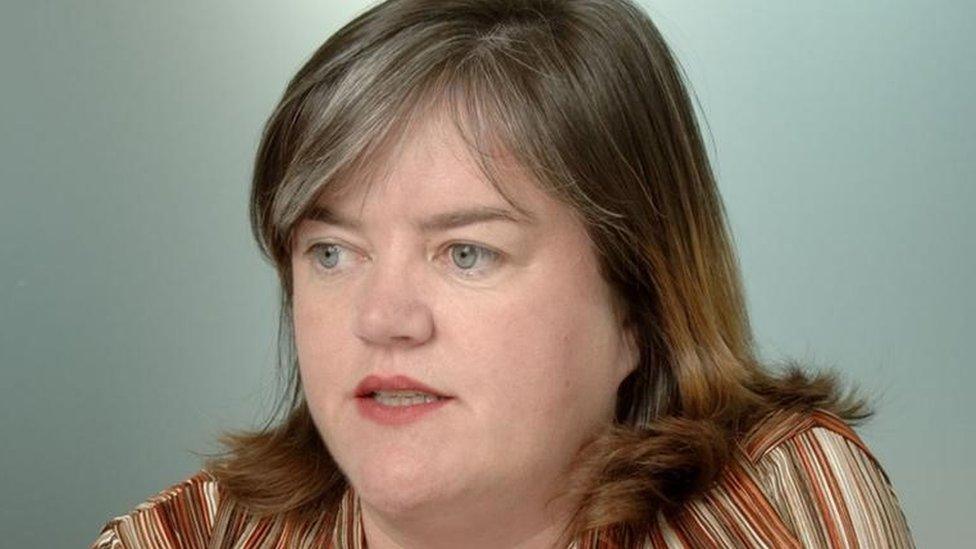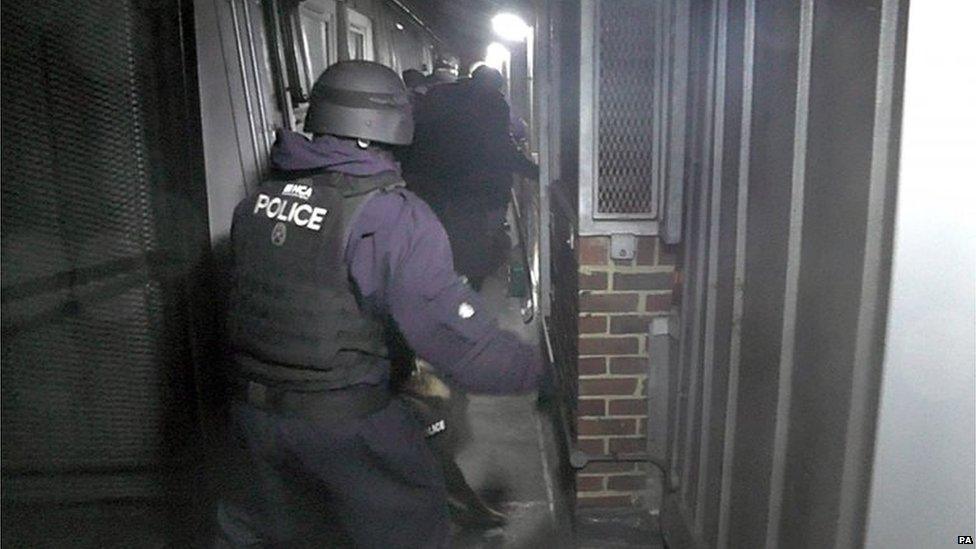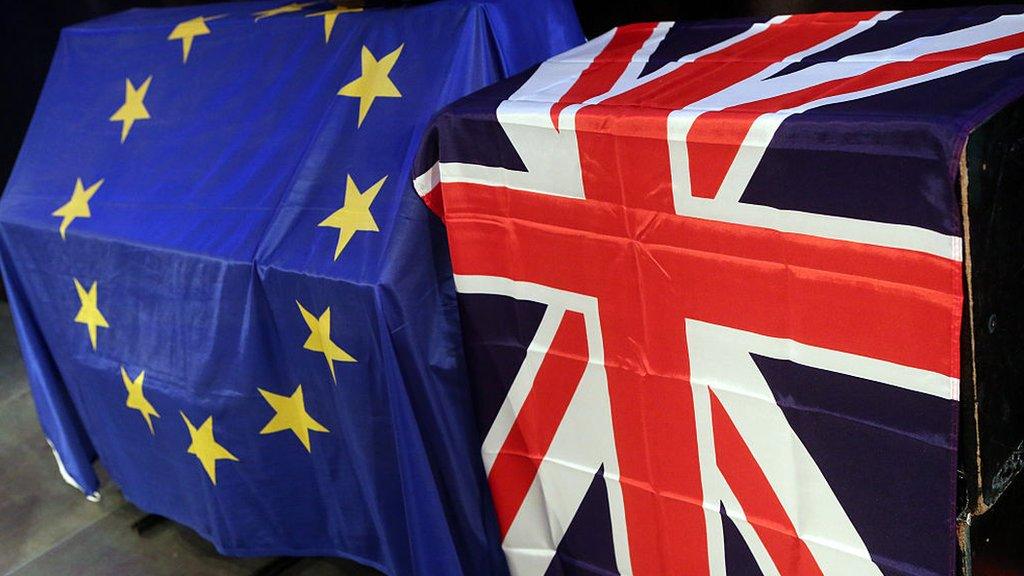Week ahead
- Published
- comments

They're back and with Brexit looming, it may not be long before the ramifications of leaving the EU begins to crowd out almost all other issues from the agenda in both Lords and Commons.
But not quite yet - with their lordships, in particular, cranking up for a considerable clash over the Higher Education Bill. And watch out for a Commons-Lords clash on peers' call for an independent inquiry into the way the police complaints system dealt with allegations of corrupt relationships between the police and newspapers... a modest appetiser, with a government decision looming on press regulation.
The one imponderable is the eagerly-awaited Supreme Court decision on whether there has to be a Parliamentary vote on the triggering of Article 50 - if that arrives (and the timing is unclear), there will be huge pressure for a rapid Commons statement setting out the next moves.
If the ruling goes against the government, it will be a highly-charged event - and if the Supremes require a full scale bill to be passed, a frantic re-jigging of the legislative timetable will follow.
Here's my run-down of the week ahead:
Monday
The Commons re-opens (2.30pm) with Work and Pensions questions - doubtless to be followed by the usual crop of post-recess ministerial statements and urgent questions.
Then MPs are on a running three-line whip for the report stage, Legislative Grand Committee and third reading of the Technical and Further Education Bill , external- where the only amendments down are from Labour's Gordon Marsden, who is proposing a series of changes, mostly aiming to give learners a voice on the panels regulating their teaching, and to create a new duty for the government to publish strategy on careers education.

Louise Casey will be giving evidence on her report on integration
The select committee of the day is the Communities and Local Government hearing (at 4pm) on the Casey Review into Integration, with its author, Dame Louise Casey.
Her review was commissioned by David Cameron and recommended a new strategy to help bridge divides in the UK, including an "integration oath" to encourage immigrants to embrace British values, and greater focus on promoting the English language and securing "women's emancipation in communities where they are being held back by regressive cultural practices". It has been criticised for focusing on Muslim communities.
In the Lords (2.30pm) peers celebrate their return with an interesting crop of questions to ministers. There is (but of course) a Brexit question, this time from the Lib Dem, Lord Maclennan, on the government's intentions for publishing a green paper on Brexit negotiations; the Green Party peer, Baroness Jones of Moulsecoomb has a question about the Pitchford inquiry into undercover policing, and infiltration of various environmentalists and radical groups; and Labour's Lord Grocott wants to highlight the fact that the vast majority of hereditary peerages exclude women from inheriting, with a question about the Register of Hereditary Peers' compatibility with equalities legislation.
But that is just a preliminary skirmish before what may become full-on trench warfare over the Higher Education and Research Bill, external.
A cross-party alliance of peers fears that this could open the way for the full "marketisation" of higher education - and that could, unusually, lead to a series of votes being forced at committee stage (this is the first of two committee stage days timetabled for this week).
First up is a 'before Clause 1' amendment from Labour's Lord Stevenson. The tell-tale sign here is that it is co-signed by heavy hitters from other groups including Crossbenchers Baroness Brown of Cambridge, who was Vice-Chancellor of Aston University from 2006 to 2016 and Baroness Wolf of Dulwich, a professor at King's College, London; plus the Lib Dem Baroness Garden, which sets out core principles of academic freedom and independence as a preface to the bill.
That's closely followed by a second amendment from Lord Stevenson and Baroness Garden, specifying that UK universities should operate "on a not-for-profit basis". Labour sources are already warning that if the government does not amend the bill to meet their concerns, it can expect a long drawn out battle of a kind not seen since the Health and Social Care Bill, during the Coalition years.
Also on the agenda is a short debate on the role of the Armed Forces Covenant in ensuring those who serve and their families are treated with fairness and respect - led by the Bishop of Portsmouth.
Tuesday
The Commons meets at 11.30am for Foreign Office questions - after which the post-holiday backlog of statements and UQs may continue. Then comes a Ten Minute Rule Bill on Mutual Guarantee Societies from Labour and Co-Operative Party MP Christina Rees . The bill encourages small and medium size enterprises to join collectively to create a Mutual Guarantee Society to negotiate a better deal from banks.
MPs then polish off their consideration of the Commonwealth Development Corporation Bill, external, which will raise the limit on the financial support that can be provided to the CDC, the UK's development finance institution.

The government suffered defeats in the Policing and Crime Bill in the Lords- will Amber Rudd reverse those changes?
Amendments include a proposal from the Labour front bench to prohibit any new investment from going to an investment vehicle or company which uses or seems likely to use tax havens.
More detailed legislating follows and the Commons considers Lords' amendments to the Policing and Crime Bill, external. The government suffered four defeats on this measure in the Upper House - on issues including the maximum sentence for stalking, a "Hillsborough" provision on financial support for bereaved families at inquests involving the police, and on an independent inquiry into the way the police complaints handled allegations of corrupt relationships between the police and newspapers. Will the Home Secretary, Amber Rudd, seek to reverse those changes, and if she does, will peers bat the bill back to MPs again?
In Westminster Hall, the Lib Dem Norman Lamb, a health minister under the Coalition, has a debate on supporting children's wellbeing and mental health in a school environment (9.30am-11am). Conservative MP Justin Tomlinson raises the issue of allocation of funding from the soft drinks industry levy for sport in schools (2.30pm-4pm) and the DUP's Sir Jeffrey Donaldson has a debate on the implementation of the Stormont House Agreement (4pm -5.30pm)
Committee of the day is the Home Affairs hearing (2.15pm) on hate crime and its violent consequences. The witnesses include Joanna Mludzinska of the Polish Social and Cultural Association, and Taduesz K Stenzel of the Federation of Poles in Great Britain, plus Professor Matthew Feldman of the Centre for Fascist, Anti-Fascist and Post-Fascist Studies, Teeside University, and Professor Matthew Goodwin, of the University of Kent.
In the Lords (2.30pm), the main legislating is on the detail of the Wales Bill, external.
Wednesday
MPs gather at 11.30am for International Development questions, followed, at noon by the first Prime Minister's question time of 2017. Next comes an interesting Ten Minute Rule Bill on Guardianship (Missing Persons) from the Conservative, Kevin Hollinrake.
Families with a missing loved one have been campaigning for guardianship powers for the past five years, to enable them to manage a missing relative's finances and property until they return, and ensure any dependents are looked after. Up to 1,500 adults are missing for longer than a year and, he says, the lack of guardianship powers means that families are powerless to deal with the practical challenges like ensuring bills are paid, homes are protected and dependents are looked after.
The result, he says, is that families are forced to stand by and watch as the life they hope their missing loved one will return to falls apart.
The main debate will be on a Labour Opposition Day motion, to be announced.
In Westminster Hall (9.30am-11am), the Conservative Anne Main leads a debate on pharmacies and integrated healthcare in England - she will talk about what pharmacies are doing at the moment, how they are funded, and make the case that pharmacies should be treating more minor ailments and chronic conditions to take pressure off GPs - and she will argue that pharmacies want to do more, and this should be reflected in their funding.
Labour's Rob Marris leads a debate on access to justice (2.30pm-4pm) and Karl Turner, who had a brief spell as Labour's shadow attorney general, raises the funding of Crown Prosecution Service (4.30pm -5.30pm).
Committee of the day is the Work and Pensions hearing (9.30am) on victims of modern slavery - with former senior judge, Baroness Butler-Sloss and Kevin Hyland, the Independent Anti-Slavery Commissioner. And keep an eye out for the Treasury Committee (2.15pm) which has one of its regular hearings with the Governor of the Bank of England, Mark Carney, and a supporting cast of BoE officials - always worth watching.
In the Lords (3pm) the main event is the week's second committee stage day on the Higher Education and Research Bill, external (see above). And there will be a short debate on equine welfare standards led by the Conservative, Lord Higgins.
Thursday
It's Transport questions in the Commons (from 9.30am), followed by the weekly Business Statement from the Leader of the House - which may, among other things, confirm a date for the long-awaited vote on plans to move MPs out of the Victorian Palace of Westminster for five years, or more, to allow for a multi-billion pound renovation programme.
Or are ministers getting cold feet about the cost and gathering backbench opposition?

There have been a number of calls from MPs to debate the situation in Yemen
The main debates are on subjects chosen by the Backbench Business Committee - first, on the humanitarian crisis in Yemen, and then on security and the political situation in the African Great Lakes region.
In Westminster Hall (1.30pm) there's a debate on the Justice Select Committee's report on Restorative Justice, external, led by Committee Chair Bob Neill - and that's followed (3pm) by a debate on the future of the UK maritime industry led by the Lib Dem former Scottish Secretary, Alistair Carmichael.
In the Lords (11am) the main events are debates led by backbench Labour peers; Baroness Massey of Darwen, on the Institute for Public Policy Research's annual State of the North report; the former International Development minister Baroness Kinnock of Holyhead on the treatment of the Muslim Rohingya minority in Burma, and the former defence secretary and Nato Secretary General, George Robertson on the future capability of the UK's armed forces in the current international situation.
The House will also wave through the Savings (Government Contributions) Bill - which, as a money bill is considered untouchable by the Lords and will go through all its stages of consideration at a single gulp.
Friday
It's private members' bill time again in the Commons, from 9.30am. First up is the second reading for the Conservative Kevin Foster's Broadcasting (Radio Multiplex Services) Bill, external. He argues that at present, the costs and licensing system don't help small-scale radio stations and radio services to access to the DAB digital radio network and his bill aims to make digital access available to all small-scale operators.
Next comes the Civil Partnership Act 2004 (Amendment) Bill, external - the Conservative Tim Loughton aims to make the option of civil partnership available to straight couples (he was accused of trying to wreck the Gay Marriage Bill when he introduced an amendment on this issue, in 2013).
Third in the running order is the Workers' Rights (Maintenance of EU Standards) Bill, external, from Labour's Melanie Onn, which will be launched at an event on Wednesday, with Labour Shadow Brexit Secretary Keir Starmer and Liz Snape (President of the TUC and Assistant General Secretary of Unison) speaking.
The bill targets a key Brexit issue for Labour, so I can't help wondering if some of the usual suspects will be padding out the previous debates, to minimise, or even eliminate the time available to it.
And at 2.30pm, when the names of undebated bills are read out for their ritual parliamentary pole-axing, watch out for a shout of "Object" against Peter Bone's Withdrawal from the European Union (Article 50) Bill.
If no-one objected, it would be deemed to have had an unopposed second reading and could go forward for consideration in committee. But someone will....a little end of day theatre, with points of order and show indignation.
- Published30 December 2020

- Published28 March 2017

